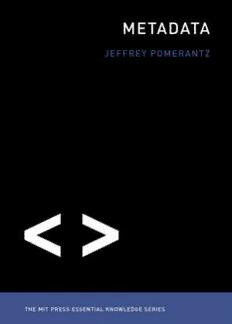
Metadata (The MIT Press Essential Knowledge series) PDF
Preview Metadata (The MIT Press Essential Knowledge series)
Metadata Metadata 10237.indb 1 9/25/15 10:41 AM The MIT Press Essential Knowledge series Auctions, Timothy P. Hubbard and Harry J. Paarsch Understanding Beliefs, Nils J. Nilsson Computing: A Concise History, Paul Ceruzzi The Conscious Mind, Zoltan L. Torey Crowdsourcing, Daren C. Brabham Free Will, Mark Balaguer Information and the Modern Corporation, James Cortada Intellectual Property Strategy, John Palfrey The Internet of Things, Samuel Greengard Memes in Digital Culture, Limor Shifman Metadata, Jeffrey Pomerantz MOOCs, Jonathan Haber Open Access, Peter Suber Paradox, Margaret Cuonzo Waves, Fred Raichlen 10237.indb 2 9/25/15 10:41 AM Metadata Jeffrey PoMerantz The MIT Press | Cambridge, Massachusetts | London, England 10237.indb 3 9/25/15 10:41 AM © 2015 Jeffrey Pomerantz All rights reserved. No part of this book may be reproduced in any form by any electronic or mechanical means (including photocopying, recording, or information storage and retrieval) without permission in writing from the publisher. MIT Press books may be purchased at special quantity discounts for business or sales promotional use. For information, please email special_sales@ mitpress.mit.edu or write to Special Sales Department, The MIT Press, 1 Rogers Street, Cambridge, MA 02142. Set in Chaparral Pro by the MIT Press. Printed and bound in the United States of America. Library of Congress Cataloging-in-Publication Data Pomerantz, Jeffrey, author. Metadata / Jeffrey Pomerantz. pages cm.—(The MIT Press essential knowledge series) Includes bibliographical references and index. ISBN 978-0-262-52851-1 (pbk. : alk. paper) 1. Metadata. 2. Information organization. I. Title. Z666.7.P66 2015 025.3—dc23 2015030578 10 9 8 7 6 5 4 3 2 1 10237.indb 4 9/25/15 10:41 AM Contents Preface ix 1 Introduction 1 2 Definitions 19 3 Descriptive Metadata 65 4 Administrative Metadata 93 5 Use Metadata 117 6 Enabling Technologies for Metadata 133 7 The Semantic Web 153 8 The Future of Metadata 187 Glossary 209 Further Readings 215 Figure Credits 223 Bibliography 225 Index 233 10237.indb 5 9/25/15 10:41 AM 10237.indb 6 9/25/15 10:41 AM series foreword The MIT Press Essential Knowledge series offers acces- sible, concise, beautifully produced pocket-size books on topics of current interest. Written by leading thinkers, the books in this series deliver expert overviews of subjects that range from the cultural and the historical to the sci- entific and the technical. In today’s era of instant information gratification, we have ready access to opinions, rationalizations, and super- ficial descriptions. Much harder to come by is the founda- tional knowledge that informs a principled understanding of the world. Essential Knowledge books fill that need. Synthesizing specialized subject matter for nonspecialists and engaging critical topics through fundamentals, each of these compact volumes offers readers a point of access to complex ideas. Bruce Tidor Professor of Biological Engineering and Computer Science Massachusetts Institute of Technology 10237.indb 7 9/25/15 10:41 AM 10237.indb 8 9/25/15 10:41 AM PrefaCe This book was borne largely out of a massive open online course (MOOC) that I taught for the University of North Carolina at Chapel Hill on the Coursera platform, in the fall of 2013 and again in the spring of 2014, titled “Meta- data: Organizing and Discovering Information.” Online teaching and learning is not a new idea by any means, but MOOCs focused a great deal of attention on this form of pedagogy, both inside and outside the academy. I had been Preface teaching online for many years when MOOCs hit the news in 2011, but the sheer scale of a MOOC captured my atten- tion. I got to thinking about what teaching and learning in Information Science might look like, if it were entirely online. I believed then, and still do, that the first course Preface in any Information Science curriculum should be a course on metadata: almost everything else in the field depends on metadata, and the subject provides a hook into most of the issues in the field. So when Carolina decided to launch its MOOC initiative, I was very excited to have the oppor- tunity to launch a course on metadata, to put my ideas to the test. I’m very pleased about how well the metadata MOOC was received. And I’m equally pleased that the course caused metadata to come to the attention of the editors of the MIT Press, as a topic worthy of being included in the 10237.indb 9 9/25/15 10:41 AM
